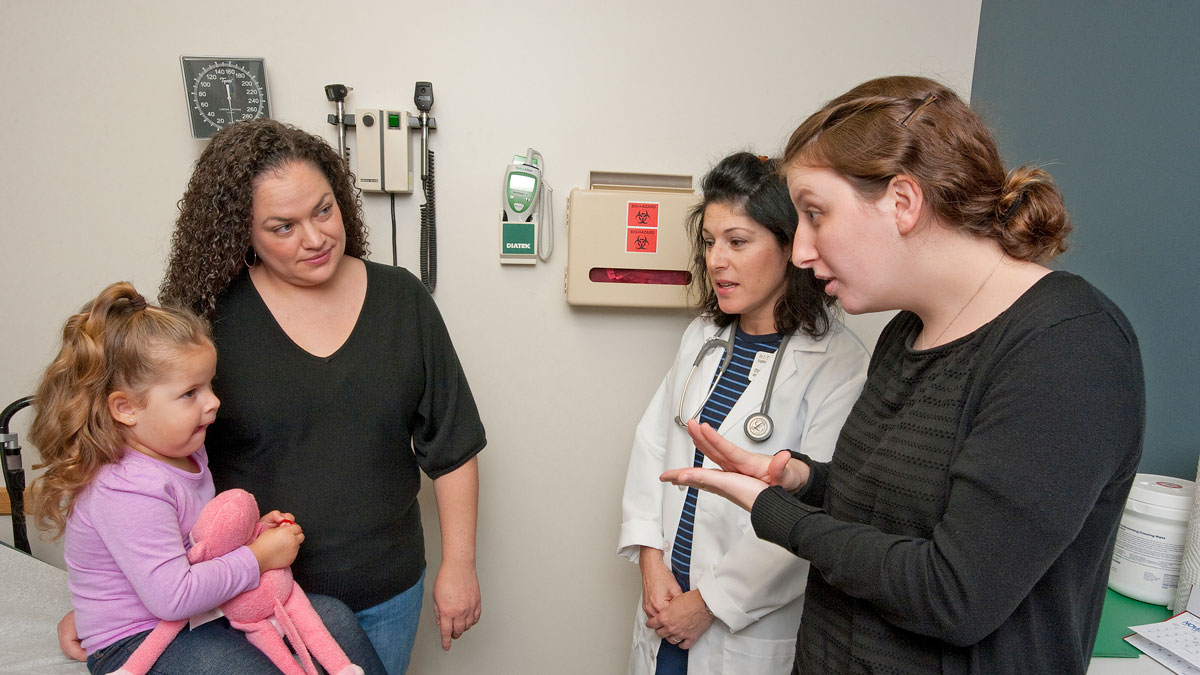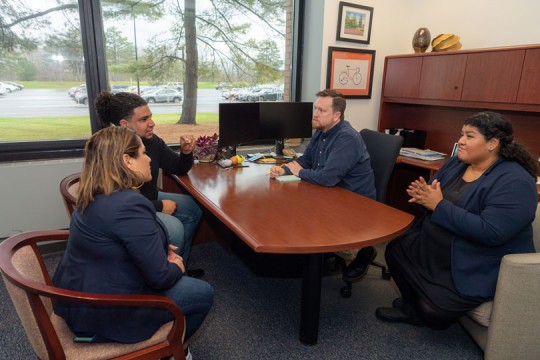Health Care Interpretation Master of Science Degree

Health Care Interpretation: Online
Master of Science Degree
- RIT /
- Rochester Institute of Technology /
- Academics /
- Health Care Interpretation MS
Our graduate degree in health care interpretation meets the demand for nationally-certified ASL-English interpreters qualified to work in the health care industry.
$53K+
Annual salary potential
18%
Employment growth for interpreters
97%
Graduate outcomes rate
$2.5B
2019 health care industry revenue
Overview for Health Care Interpretation MS
The MS in health care interpretation is specifically designed for nationally certified ASL-English interpreters interested in advancing their education through specialized training in health care interpreting. Demand for interpreters is expected to grow 18% over the next ten years, more than three times the rate of the overall job market, with health care as the second highest-demand industry. This program has been developed as a response to meet this rising demand.
What is an ASL Medical Interpreter?
ASL-English medical interpreters are trained to facilitate communication between Deaf or hard-of-hearing individuals who use American Sign Language (ASL) and hearing individuals who communicate in English. These interpreters possess fluency in both languages, an understanding of Deaf cultural values and norms, ethical and professional standards, and specialized knowledge of medical terminology, procedures, and health care protocols. ASL-English medical interpreters work in various health care settings, conveying complex medical information to ensure patients receive the care they need and can fully participate in decisions affecting their health
RIT/NTID’s Master’s in ASL Medical Interpretation: Offered Exclusively Online
The National Technical Institute for the Deaf’s Department of American Sign Language and Interpreting Education administers the program, with some coursework from RIT’s College of Health Sciences and Technology. This unique program:
- Meets the growing demand for specialized sign language health care interpreters as more deaf and hard-of-hearing professionals enter medical/health care fields.
- Increases the number of specialized sign language interpreters working in patient health care settings.
- Prepares interpreters to work in leadership roles in the health care interpreting field.
The program begins with the Professional Seminar course designed to establish the theoretical parameters students are expected to follow in case analysis, establish a framework for conducting online discussions in safe and confidential ways, and create connections among classmates that build trust and rapport. This initial connection promotes student engagement in the reflection-based components of the program. The curriculum employs an online pedagogical approach, including accelerated courses as its primary delivery system. Each course will require an estimated 9-12 hours per week for class assignments, and course materials will be delivered asynchronously. In the final semester, students will complete a capstone course consisting of a research paper or a project. The program is currently offered part-time for two academic years (with two summers).
-
Applications for full-time study for this program are due soon.
- No announcements are currently running for this program.
Curriculum for 2025-2026 for Health Care Interpretation MS
Current Students: See Curriculum Requirements
Note for online students
The frequency of required and elective course offerings in the online program will vary, semester by semester, and will not always match the information presented here. Online students are advised to seek guidance from the listed program contact when developing their individual program course schedule.
Admissions and Financial Aid
This program is available exclusively online.
| Offered | Admit Term(s) | Application Deadline | STEM Designated |
|---|---|---|---|
| Part‑time | Summer | March 1 | No |
Part-time study is 1‑8 semester credit hours. RIT will not issue a student visa for programs offered exclusively online.
Application Details
To be considered for admission to the Health Care Interpretation MS program, candidates must fulfill the following requirements:
- Complete an online graduate application.
- Submit copies of official transcript(s) (in English) of all previously completed undergraduate and graduate course work, including any transfer credit earned.
- Hold a baccalaureate degree (or US equivalent) from an accredited university or college. A minimum cumulative GPA of 3.0 (or equivalent) is recommended.
- Submit a current resume or curriculum vitae.
- Submit a personal statement of educational objectives.
- Submit two letters of recommendation.
- Entrance exam requirements: None
- Letters of recommendation should come from interpreter colleagues, mentors, or Deaf community members who have had the opportunity to observe the applicant’s interpreting work.
- Submit current national ASL/English certification, Board for Evaluation of Interpreters (BEI), or state licensure. Applicants must email a copy of their credentials to the NTID Office of Admissions at ntidadmissions@ntid.rit.edu.
- Submit an ASL interpretation sample.
- Submit an audiogram (applies to Deaf and hard-of-hearing applicants).
- Submit English language test scores (TOEFL, IELTS, PTE Academic, etc.), if required. Details are below.
English Language Test Scores
International applicants whose native language is not English must submit one of the following official English language test scores. Some international applicants may be considered for an English test requirement waiver.
Duolingo (DET): case by case
IELTS: case by case
LanguageCert Academic: case by case
PTE Academic: case by case
TOEFL: case by case
International students below the minimum requirement may be considered for conditional admission. Deaf and hard-of-hearing test takers with significant hearing loss do not need to take the listening and speaking sections for the TOEFL and IELTS. Each program requires balanced sub-scores when determining an applicant’s need for additional English language courses.
How to Apply Start or Manage Your Application
Cost and Financial Aid
An RIT graduate degree is an investment with lifelong returns. Graduate tuition varies by degree, the number of credits taken per semester, and delivery method. Because RIT receives federal support, students in the Health Care Interpretation MS program pay less than RIT's regular tuition rate. View the Deaf and Hard-of-Hearing and Hearing NTID-Supported Students tuition section in cost of attendance
A combination of sources can help fund your graduate degree. Learn how to fund your degree
Additional Information
Medical Terminology Course Requirement
Applicants accepted into the program must complete The Language of Medicine, a self-paced online course in medical terminology, before the beginning of the summer term. Acceptance materials will include instructions for accessing the course.
Online Study Restrictions for Some International Students
Certain countries are subject to comprehensive embargoes under US Export Controls, which prohibit virtually ALL exports, imports, and other transactions without a license or other US Government authorization. Learners from the Crimea region of the Ukraine, Cuba, Iran, North Korea, and Syria may not register for RIT online courses. Nor may individuals on the United States Treasury Department’s list of Specially Designated Nationals or the United States Commerce Department’s table of Deny Orders. By registering for RIT online courses, you represent and warrant that you are not located in, under the control of, or a national or resident of any such country or on any such list.
Accreditation
Related News
-
July 7, 2023

RIT’s National Technical Institute for the Deaf offers five certificate programs in American Sign Language interpreting
To enhance the skills of interpreters in the field, NTID is now offering five certificate programs in American Sign Language specialties.
-
May 9, 2022

Alumna facilitates crucial conversations as medical interpreter
Debbie Lesser '19 is a catalyst, facilitating crucial conversations taking place in often highly sensitive situations. As a certified medical interpreter, she assists deaf, hard-of-hearing, and hearing patients and health care providers in communicating with one another regarding everything from mental health crises to detailed complex medical procedures.
-
May 11, 2020

RIT/NTID students graduate with accolades
Several students at NTID were honored with academic achievement awards ahead of RIT’s virtual commencement ceremony on May 8.
Contact
- Katelyn Moran-Pearlman
- Admissions Counselor
- NTID Enrollment Management
- National Technical Institute for the Deaf
- 585‑225‑7394
- kmpnca@rit.edu

- Rachel Rosenstock
- Adjunct
- mshci@rit.edu
Department of ASL and Interpreting Education














